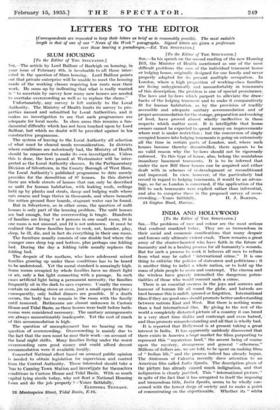[To the Editor of THE SPECTATOR.]
SIR,—In his speech on the second reading of the new Housing Bill, the Minister of Health mentioned as one of the most difficult problems the case of the individual tenement house or lodging house, originally designed for one family and never properly adapted for its present multiple occupation. In London, where a high proportion of working-class families are living unhygienically and uncomfortably in tenements of this description, the problem is one of special prominence. The laws and by-laws which purport to alleviate the draw- backs of the lodging tenement and to make it comparatively fit for human habitation, as by the provision of readily accessible and adequate sanitary accommodation and of proper accommodation for the storage, preparation and cooking of food, have proved almost wholly ineffective in those respects which matter most. It is intelligible that house owners cannot be expected to spend money on improvements where rent is under restriction ; but the conversion of singly occupied houses into lodging tenements is going on extensively all the time in certain parts of London, and, where such houses become thereby decontrolled, there appears to be no valid reason why the by-laws should not be rigorously enforced. To this -type of house, also, belong the scandalous insanitary basement tenements. It is to be inferred that under the new Bill these houses can be acquired and either* dealt with in schemes of re-development or reconditioned and improved. In view, however, of the particularly bad record in regard to lodging tenements, it would be an advan- tage, so far as London is concerned, if the application of the Bill to such tenements were explicit rather than inferential, and also to comprise these in the proposed survey of over-










































 Previous page
Previous page